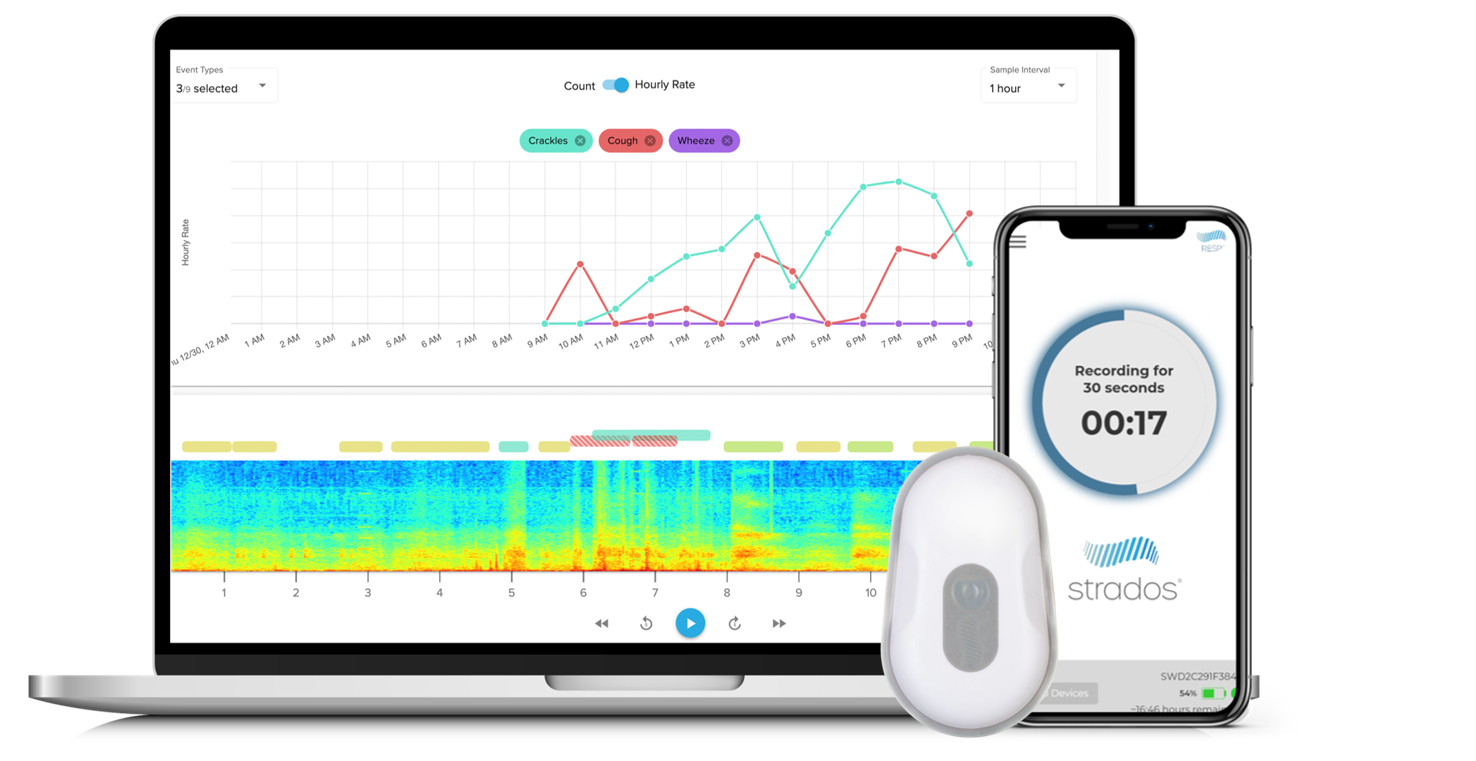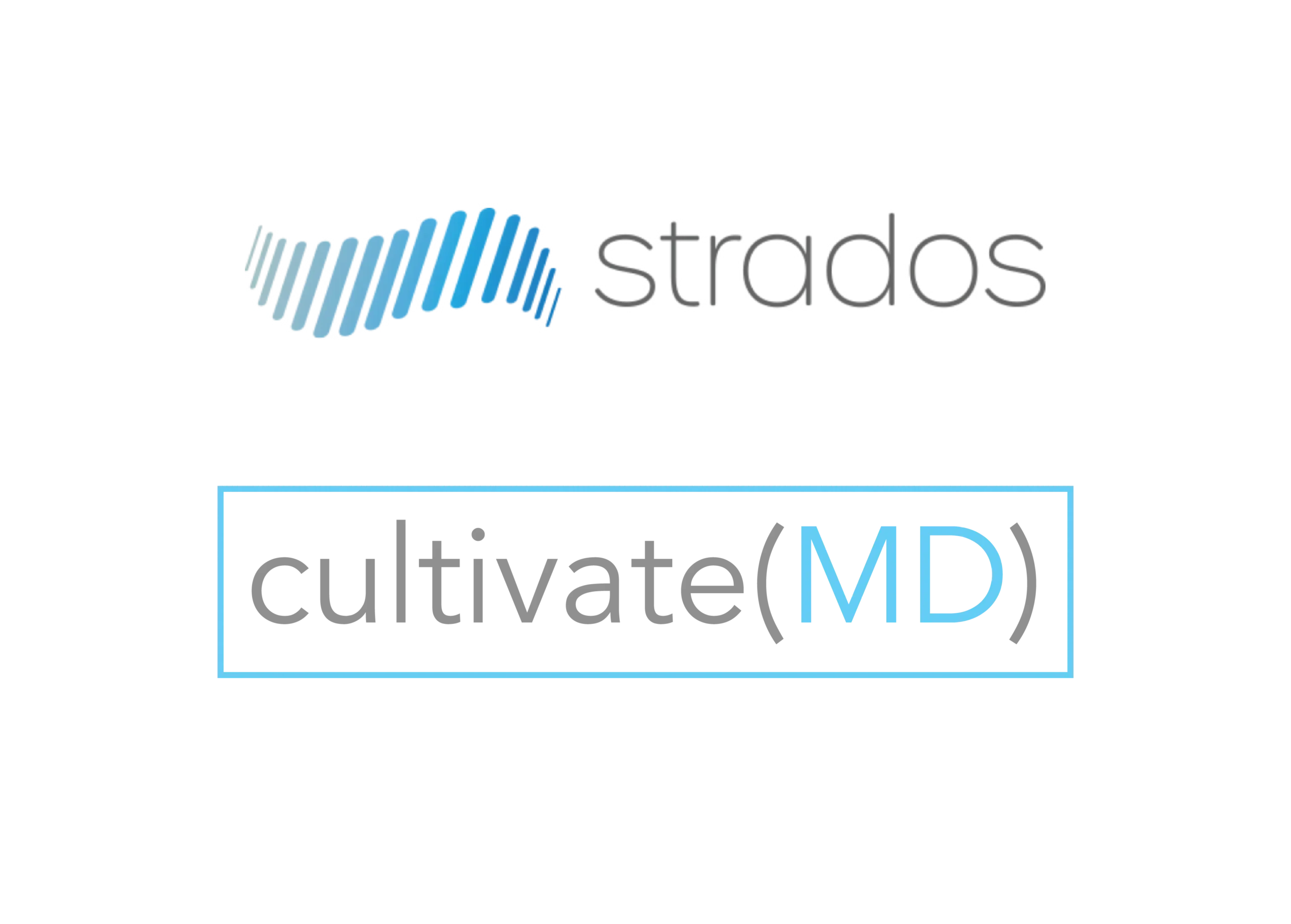Strados
Strados Labs, a medical technology firm, utilizes advanced smart sensors, machine learning, and unique algorithms to facilitate the early identification and prediction of deteriorating respiratory conditions.

Strados
Strados Labs, a medical technology firm, utilizes advanced smart sensors, machine learning, and unique algorithms to facilitate the early identification and prediction of deteriorating respiratory conditions.

Strados Labs

Manage Lung Health from Hospital to Home
Strados Labs has developed the RESP Biosensor, addressing the global impact of chronic respiratory diseases like COPD and Asthma which affect over 300 million people. This innovation is a response to the medical community’s search for better respiratory disease surveillance and management methods.
The RESP Biosensor is designed to enhance the understanding of a patient’s respiratory health from home. It continuously records lung sounds, including coughs, wheezes, crackles, and instances of shortness of breath. These sounds are analyzed in relation to various factors such as medication, medical devices, physical activity, and more.
This comprehensive monitoring leads to a deeper understanding of how patients respond to treatments and provides early indications of exacerbations, thereby aiding in preventing unnecessary hospitalizations.
Strados' Mission
Strados is committed to transforming the management and surveillance of chronic respiratory diseases such as COPD and Asthma. They are developing and implementing advanced technologies like the RESP Biosensor. This tool enables a more accurate understanding of patient respiratory health, especially at home.
By continuously capturing and analyzing lung sounds and related symptoms, Strados Labs aims to enhance the effectiveness of treatments, provide earlier insights into disease exacerbations, and ultimately reduce the need for hospitalizations. They focus on leveraging intelligent sensor technology, machine learning, and proprietary algorithms to predict and detect early signs of respiratory disease worsening, thereby contributing to improved patient outcomes and more efficient healthcare management.
Technology & Products
RESP™ Biosensor: The RESP Biosensor is compact, discreet, and hands-free, allowing patients to wear it without noticing it’s there. Operating on a ‘set it and forget it’ principle, this wearable device continuously captures lung sounds in all situations, whether the patient is asleep, exercising, or spending time with loved ones. This increases patient adherence to the device and provides clinicians and care teams with more comprehensive data.
- The RESP™ Biosensor provides medical professionals with a systematic way to track early indicators of exacerbations in patients prone to serious pulmonary issues.
- It enables clinicians to observe patients’ real-time cough and wheeze data, facilitating a more informed assessment of their respiratory health.
- Designed with both the patient and clinician in mind, the RESP Biosensor alleviates patient discomfort and enhances the efficiency of healthcare providers.
Why Monitor Cough and Wheeze?
- One out of five patients hospitalized for COPD are readmitted within a month of discharge (source).
- Research indicates that a rise in cough frequency can foretell exacerbations (source).
- Investigations reveal that patients often struggle to monitor early indicators like coughing and wheezing.
- Traditional diagnosis of COPD and asthma through stethoscope auscultation is confined to face-to-face consultations, subject to variability between observers, and lacks a means for record-keeping.
Clinical Trials
Chronic Cough: The RESP Biosensor provides an effective and user-friendly method for round-the-clock ambulatory cough monitoring, from initial subject screening to various stages of research. It employs a rigorous consensus labeling method to guarantee accuracy in the number of coughs detected. The device also measures cough intensity, physical activity*, and sleep/wake cycles.*
Pulmonary Fibrosis: Coughing and lung sounds like crackles, closely linked with IPF and ILD, can be monitored for 24 hours using the RESP Biosensor. This enables researchers to obtain objective data on treatment responses, complementing subjective assessment tools like the VAS and Leicester Cough Questionnaire.
Chronic Bronchitis: Cough, a key symptom of bronchitis, is often monitored over 24 hours to assess the effectiveness of treatments. The RESP Biosensor provides a patient-centric solution for tracking coughs in bronchitis while also offering the capability to gather further insights.
COPD & Asthma: The RESP Biosensor enables researchers to objectively track cough and lung sounds, including wheezing and instances of shortness of breath*, in patients with COPD and Asthma. This complements conventional assessment methods like spirometry, as well as the COPD Assessment Test, Asthma Control Questionnaire, and the St. George’s Respiratory Questionnaire.
Infectious Diseases: Infectious diseases like COVID-19 and RSV affect the lungs, resulting in symptoms like coughing, wheezing, and shortness of breath. The RESP Biosensor can provide an extra understanding of the effectiveness of infectious disease treatments by evaluating their effects on respiratory health.
Congestive Heart Failure: Symptoms related to respiratory issues, including coughing, wheezing, shortness of breath, and fluid accumulation, are prevalent in Heart Failure. The RESP Biosensor provides a method for clinical trial researchers to quantify these symptoms objectively.
*Measurement not FDA-cleared

